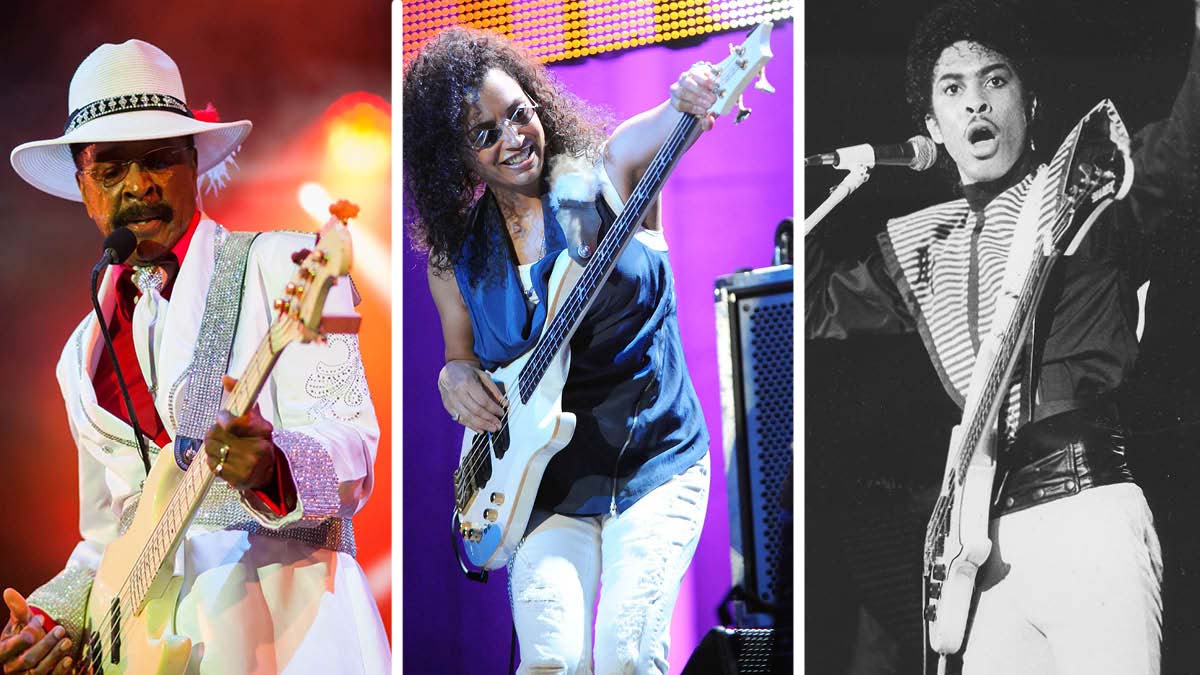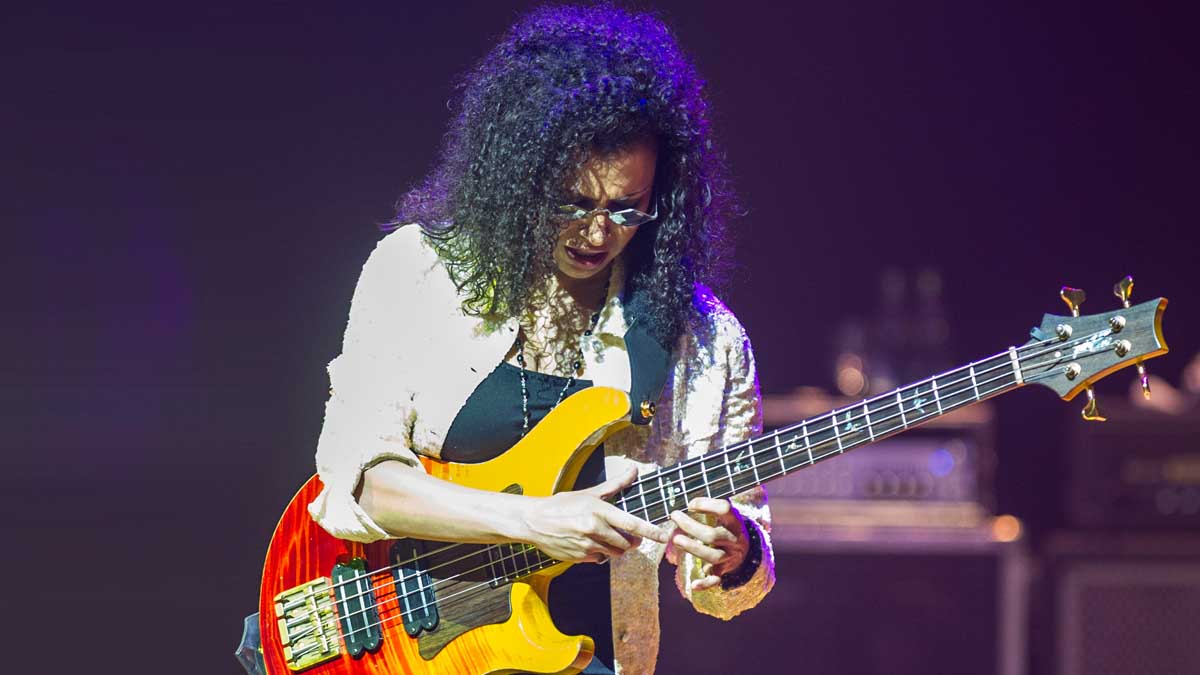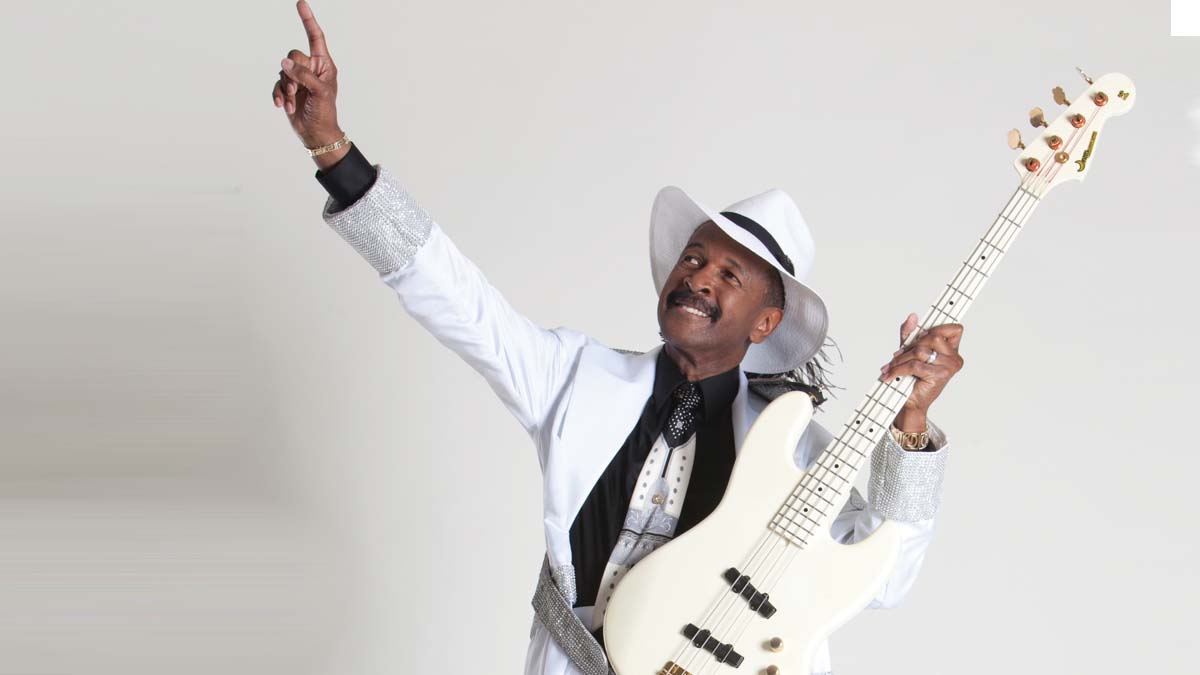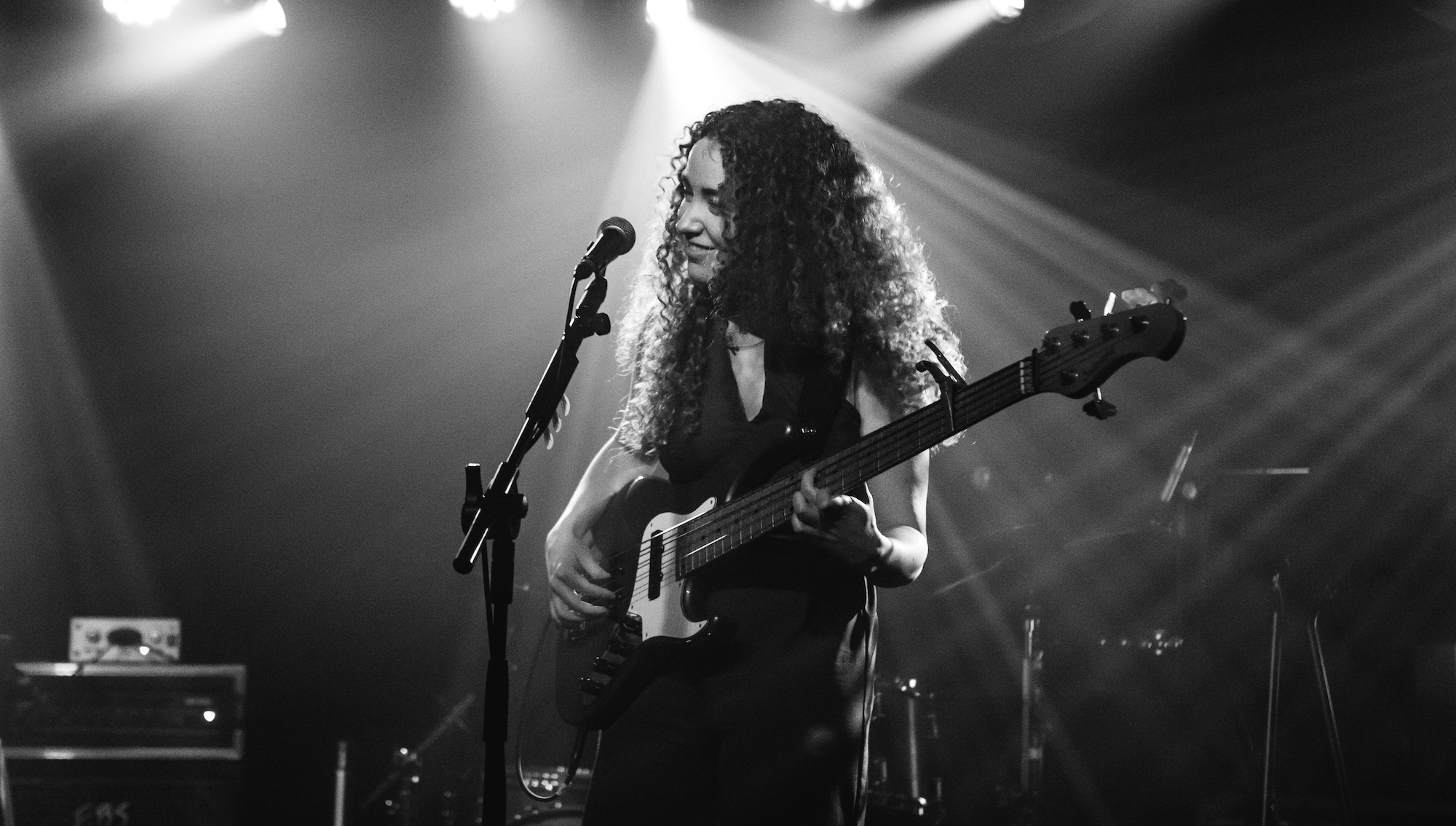Prince's bass players over the years: in their own words
Prince, a masterful bassist in his own right, employed a series of phenomenal bass players. Let's met the team...

Prince could play just about everything, and he was certainly no slouch in the bass department – his knack for a slippery bassline propelled much of his formidable back catalog to funk greatness.
But the Purple One was also known to seek out and employ some of the finest four and five-stringers in the business.
Here, we've catalogued some of the most prominent bassists to play with Prince. Let's hear from the lineup, in their own words…
André Cymone
Worked with Prince 1979-81.
“The bass that’s on a lot of the original records, like The Time records, I still have it. It’s a Jazz bass. All the early pictures of me with Prince, and I’m wearing the clear pants, I’ve got that bass. I have black nylon strings on now, that’s the only difference. For a while I pasted on some leopard print, but I took that off. We got it a long time ago. Me and Prince used to go to this guitar shop that they used to kick us out of, at first, because we were kids. We’d go there and they’d say, ‘You guys don’t have any money – get out!’
“And it’s true that we couldn’t afford anything, but eventually they let us play, because they’d say ‘You guys are good!’ So they let us sort of jam. And when we finally got some money, we went in there, and even though Prince told a different story and I hate to say he’s wrong, he bought that Telecaster that he plays on everything, the Hohner. And I bought the Jazz. If not the same day, then around the same time.
“The greatest bass player that ever lived? I’m gonna say Sonny Thompson. We were in Rotterdam, with the NPG, and we played at this club called Birds, just jamming, I was on guitar, and he did this bass solo and it started out like it was gonna be bad, because he changed the time, but he completely flipped the time signature. And I was just looking at him, shocked. And it blew me away. Afterwards I said to him, ‘Man, that was the most amazing bass solo I ever heard.’”
Get The Pick Newsletter
All the latest guitar news, interviews, lessons, reviews, deals and more, direct to your inbox!
Mark 'Brown Mark' Brown
Worked with Prince 1981-86; appears on Purple Rain (1984), Around The World In A Day (1985), Parade (1986), Sign O’ The Times (1987).
“Playing with Prince was like attending an intense school of raw funk-rock. With freedom to express myself, he enabled me to grow not only as a bassist, but also as a performer. The work ethic I gleaned from him helped me in every aspect of my music career, from songwriting to stage performance. You can do anything you put your heart and mind into.”
Levi Seacer Jr.
Worked with Prince 1987-91; appears on Lovesexy (1988), Graffiti Bridge (1990).
“Guitar is my main instrument, but Prince taught me how to be a bass player. At first, it was hard for me because I was used to guitar solos, but I had to hold it down – I was part of the foundation of the house. A lot of players want to be Stanley Clarke or Marcus Miller, but that had no place in our band. Unless Prince gave you a solo...
“In rehearsals, the bass player stood next to the hi-hat, and the pocket was supposed to be a little behind the drummer, so you get that funky drag. The guitar player was kind of in between those two, and the keyboard was on top, adding colors. Prince was a stickler for the instruments staying in their areas. And he didn’t mind looping a part until it felt right.”
Sonny Thompson
Worked with Prince 1990-2009; appears on Diamonds And Pearls (1991), Love Symbol (1992), Come (1994), The Gold Experience (1995), Chaos And Disorder (1996), Emancipation (1996), 3121 (2006), Planet Earth (2007).
“Prince, Andre and I grew up together, but I didn’t realize Prince played bass until he came over to my house one day. We were down in the basement, where I had all the equipment set up, and we were playing around. He was cold on the drums! When he picked up bass, he was trying to match it, and I said, ‘Hold on, let me show you something, man.’ I taught him a lot about bass, guitar, and using his falsetto.”
“The last time I saw him, at Bunker’s in Minneapolis, I told him, ‘Man, I love you till the end of time.’ He said, ‘I love you, too, Sonny.’ That was the last thing I got to say to him. When I found out he died, I couldn’t do anything for two weeks. It’s still so hard. But I’ve got to move forward.”
Rhonda Smith

Worked with Prince 1996-2010; appears on Emancipation (1996), Crystal Ball (1998), Rave In2 The Joy Fantastic (2001), One Nite Alone... Live! (2002), Xpectation (2003), C-Note (2003), N.E.W.S. (2003), Musicology (2004).
“The years that I spent with Prince were absolutely incredible. There were lots of ups and downs, but it was a relationship that spanned from 1996 to 2010, when I joined Jeff Beck. It was on and off sometimes, and then we’d get back together, because we had a relationship where we needed to get separated, you know – so we’d get back together and then separate again, haha! But it was really amazing to be part of his experience. At the time it was the biggest thing that I had ever walked into, and it changed the trajectory of my life.
“I auditioned for him quite a while before I got the gig, because he was not quick about making a decision like that. When I first met him, I brought a fretless bass down to the audition with me, because at that time in the '90s a lot of people were using keyboard samples. I guess he liked the instrument – he asked me to play the fretless on two songs.
“One was I Can’t Make U Love Me, which was a version of a Bonnie Raitt song, and the other one was Dreamin’ About U. That was his own composition, a very beautiful ballad – and he asked me to take a solo on it, with the fretless. I was thinking, ‘What? I must have done something right.’ So there’s a lot of special moments there. It was the most amazing musical experience that I have ever had.
Prince was a monster bass player. That guy could play some bass, you can believe it – and it was all about the feel
“Prince was a monster bass player. He used different techniques: in fact, he used a lot of hybrid stuff that from an educational standpoint was bad technique, and wrong, and you’d think that he shouldn’t have played like that. But that, to my mind, was part of the sound that he got.
“That guy could play some bass, you can believe it – and it was all about the feel. It’s not about how fast he could play or whatever, it was his feel, which was phenomenal. He was from that Willie Weeks kind of school, where he could take two notes and do a solo with them, and make you go, ‘What?’”
Larry Graham

Worked with Prince from 1998.
“There are some bassists that I’ve played with, where we can play at the same time and complement each other. For example, Marcus Miller and I work well as he plays his lines like a vocalist. When Stanley Clarke and I work, he plays piccolo bass, and they don’t clash as his choice of part is different. And Prince and I play bass – and again it works, even though it’s different.”
“Bass players are always aware of other bassists. I went through a long period of time where I didn’t realize my influence on other bassists. There weren’t lots of videos of my stuff around, so people couldn’t see what I was doing, but as we did more TV shows, people realized they had to play like me, especially in covers bands playing the tunes I’d played on.
“Over time, I became more aware of players playing like me – players in other genres started thumping and plucking. To me, they are like my bass children. I have high respect for the overhand style of playing, and when I see a player pull that thumb back, it’s another of my bass children right there.”
Josh Dunham
Worked with Prince 2005-10; appears on 3121 (2006).
“I once asked Prince if he would show me some stuff on bass, and he was like, ‘No,’ and he walked out. But he would come to rehearsal and say, ‘Let me see the bass,’ and that would be his way of sharing his ideas and approach to playing... Prince was serious about getting that tone right.
“He asked me, ‘Why are you using the bass [knobs] on the amp and on the bass? Don’t you just need one?’ So then I started putting the bass on my amp on zero and controlling my tone from the bass guitar. I heard all the low notes, but it wasn’t boomy, especially when we played big stadiums. It made so much sense.”
Tal Wilkenfeld

Worked with Prince 2009-10; appears on Welcome 2 America (2021).
“At one point, Prince played my Sadowsky four-string, and it sounded like a completely different instrument. It reinforced my belief that tone is in your fingers. Prince recorded to tape and worked very quickly – and he never wanted to punch in unless it was absolutely necessary. That taught me how to how to work fast and effectively, and commit to my decisions...
“When you approach music from that place, everyone has something to say, and something to learn from a conversation. There’s no way you can walk away from situations like that without picking up on some of the nuances and the subtleties they bring to the music.
“I love collaboration. If I can enhance a project with something I can contribute creatively, I’m in. Ultimately, I’ll listen to what my heart tells me to pursue, as I’ve always done, and follow the inspiration.”
André Gouché
Worked with Prince 2011-14.
“I tried to get him to play my bass, but he wouldn’t touch it because it was a six-string. When I first joined the band, he joked, ‘Why you gotta have all those strings? Larry’s bass only has four strings.’ And I told him, ‘Well, this bass has those four strings on it, too.’ But when I hit him with that low B flat in Purple Rain– I tune my six down a whole step – he turned around and looked at me like, ‘Ooooh, damn!’ He loved it.”
Ida Nielsen
Worked with Prince 2010-16; appears on Plectrumelectrum (2014).
“When I joined Prince’s band 3rdeyegirl in 2010, I thought I knew a lot of his songs, but we were just getting started. There was no quick route other than sitting down and learning the songs, and I was joining a band that was already there, so I had a month to catch up which added some pressure. That was a lot of work! But at a certain point, I got to a place where I was able to learn really fast and remember stuff clearly.
“In the beginning, I would write everything down and keep it – but then I amazed myself at how quickly I was able to learn, remember and recall quickly. It was training, just like everything else is training. Prince used to modify songs on a daily basis, and changes happened very quickly. It was always on the spot. There might be a whole new arrangement at soundcheck, and then that would be the version we would play that night.
“Some of it could be on the spot in the show; he would say ‘Watch me’ and direct stuff. When it worked, it was really cool. We did the craziest thing once – we were doing a live TV show in France, and he didn’t tell us up front what we were going to play, so every song was called on the spot. That kept us on our toes!”
Nik West
Worked with Prince 2012-16.
“Larry Graham is my bass hero. Prince wanted to introduce me, and he was shocked we had never met. Every time I was at Paisley Park, we talked about it, and he called him a few times while I was there, but he wasn’t available. So, we kept missing each other. It wasn’t until Prince passed that Larry reached out to me. He told me that he loved the way I played.
“He said, ‘Many bass players have a million notes under their fingers and in their head, but we don’t feel what’s in their heart. You play with all of your heart, and that’s why I want to work with you.’ He told me that he was crowning me Queen of Funk and I would be the new funk hero. I took it and ran with it! I was just so shocked that he had been watching me for so long.”
Lindsey Borders, Guitar Girl Magazine
Mono Neon
Worked with Prince 2015-16.
“Prince allowed me to be myself. He saw my colors, saw the sock on my bass, heard the way I played, and simply welcomed me into his world. He gave me a chance without a compromise.
“The one thing I learned from Prince just by watching him work is how to be confident with your ideas and move forward without shame. Overall, playing with Prince taught me how to embrace the moment, the now, when playing my bass.”
“I asked him to get me four bass strings because I only had a $29 guitar from Sears”: Bootsy Collins is one of the all-time bass greats, but he started out on guitar. Here’s the sole reason why he switched
“I got that bass for $50 off this coke dealer. I don’t know what Jaco did to it, but he totally messed up the insides!” How Cro-Mags’ Harley Flanagan went from buying a Jaco Pastorius bass on the street to fronting one of hardcore’s most influential bands










